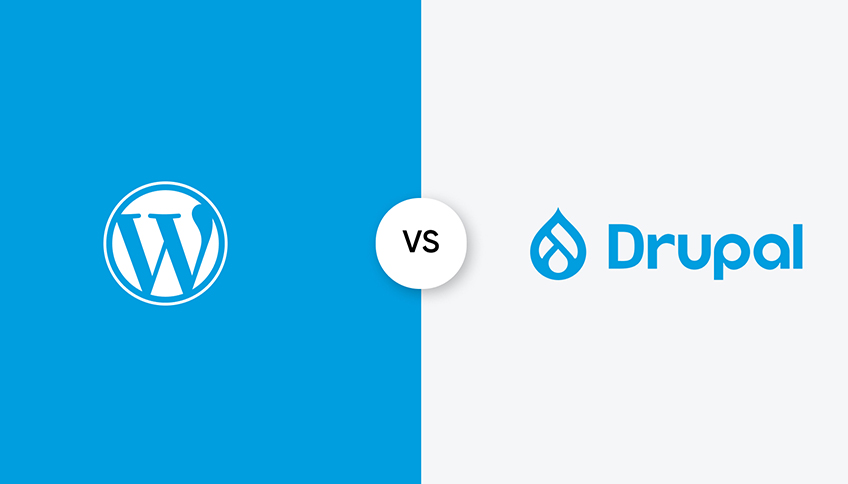Drupal VS WordPress differences are here to let you decide which is the better platform.
Drupal VS WordPress: A Guide to Summarize Key Differences
It is always tough to make a choice between two powerful content management systems. However, knowing ins and outs about both of them can help to make better decisions. This can also help when you are confused about whether to choose Drupal development services or hire WordPress development company.
Talking separately about both of them will help to lineout the benefits that these CMSs bring to your business. Drupal and WordPress are among the two most efficient content management platforms. Owing to the benefits they bring for businesses, both got popular among businesses and casual users worldwide.
Both of these platforms are open-source and highly flexible. These platforms are designed for ease of use, requiring no programming skills for basic management tasks.
Despite their similarities, key differences between WordPress and Drupal set them apart. These differences are particular in terms of ease of use and data protection. In this post, we’ll dive into the WordPress vs. Drupal debate to find key differences. The article will also focus on three critical areas where these platforms diverge. We will aim to provide insights that will help you select the right CMS for your project.
Let’s Start by Understanding These Platforms Individually
WordPress
WordPress in general is associate with blogging. However, WordPress was originally conceived in 2003 as a platform to democratize publishing and allow anyone to share their voice on the Internet with ease. It was designed to be a user-friendly, DIY tool for bloggers and content creators. However, WordPress has significantly evolved with the time.
While it started as a merely a blogging platform, it has now grown a lot in terms of features and functionality. Today, WordPress is a robust content management system (CMS) capable of powering a wide variety of websites beyond just blogging capabilities. It supports everything from simple personal blogs to complex e-commerce sites, corporate websites, and large-scale online publications.
WordPress’s versatility is a key reason for its easy adoption among users. If stats are to be believed, over 30.6 million live websites are powered by WordPress. This is possible due to platform scalability and adaptability. Users appreciate its extensive library of themes and plugins. These functionalities allow for significant customization without requiring advanced technical skills.
The growth of WordPress from a basic blogging tool to a comprehensive CMS has been driven by its commitment to open-source development and a large, active community. This community continuously contributes to the platform growth. This ensures that WordPress remains at the cutting edge of web development technologies for a number of companies operating in as WordPress development company.
Drupal
Drupal has been designed for more complex projects. The platform was released three years later after WordPress and got attention as a programmer-focused platform. The platform in comparison to WordPress CMS is a bit complex with less user-friendly interface. However, recent efforts by the Drupal community aim to make it more accessible to non-developers.
This complexity is one reason Drupal powers a smaller number of live sites. Drupal is a preferred choice to high-profile entities such as government agencies, large corporations, and renowned universities. As they require a versatile platform to show various business aspects, Drupal truly reflects the platform’s robustness and scalability.
Before we dive deep into the key differences between Drupal and WordPress, it’s essential to acknowledge their similarities. The list of similarities between both platforms are much similar. Both platforms are open-source and highly customizable. This offers significant value regardless of which one you choose. They empower users to create and manage content effectively. More number of similarities is defined further. Keep on reading!
Similarities Between Drupal and WordPress
-
Zero initial cost
In the Drupal vs. WordPress difference battle, one undeniable advantage of both platforms is that the initial cost of using them. And the good news is the cost for either is zero.
-
Open-source nature
Considering the open-source nature of both content management systems, both Drupal and WordPress are free to download, install, and use. This means you can access their code and customize it to meet your specific needs. Added to that there is no expensive license cost involved, which is often the case with commercial software.
-
Ease of use
The initial concept behind content management systems (CMS) was to empower ordinary users to achieve what programmers could with utmost ease of use. The idea was also to offer the ease without the need to write a single line of code. This idea has shaped platforms like WordPress and Drupal, making them accessible to non-technical users for basic website management tasks.
-
Scalability
A notable similarity between Drupal and WordPress is their remarkable ability to easily scale or add new features through plugins (WordPress) or modules (Drupal). These extendable components empower users to perform virtually any function on their websites. This eases the task when there is a requirement to adapt to various needs as per project requirements.
Drupal Vs WordPress: Key Differences
- Security aspect
Drupal
When it comes to security, Drupal development company services stands out as one of the most secure systems among open-source platforms. There is a team behind Drupal to identify vulnerabilities and develop patches to address them. The Drupal Security Team consistently rolls out regular updates and produces detailed reports. This ensures that the platform remains resilient against potential threats for the platform.
WordPress
WordPress is immense popular. This makes it an easy target for hackers. This targeting in the WordPress generally happens due to WordPress’s extensive plugin ecosystem. With thousands of plugins available, the WordPress team lacks the resources to thoroughly vet each one for security vulnerabilities. Due to similar reason, WordPress’s security is compromised many times.
-
Usability aspect
Drupal
Drupal can be described as a “true framework,” requiring more effort and knowledge to manage effectively compared to other CMS platforms. This highlights Drupal’s flexibility and power, particularly in content management. Unlike WordPress, which is designed for ease of use, Drupal offers a level of flexibility that appeals to users with advanced needs and technical skills.
WordPress
Comparing Drupal vs. WordPress, the latter shines in its simplicity and user-friendliness. Unlike Drupal, which often requires diving into code, WordPress users can primarily work with themes or plugins to customize their sites. With thousands of themes available—both commercial and free—users can easily install a theme and customize it to their liking or needs of businesses without needing advanced technical skills.
-
Content Distribution Aspect
Drupal
Drupal in content distribution aspect is ideal for seamless deployment across multiple platforms. All thanks to its decoupled or headless architecture. This core Drupal feature is prominent since the release of Drupal 8. With this architecture, developers can independently work on the back-end and presentation layers, exchanging data via REST API endpoints. In this setup, Drupal acts solely as a repository, sending data to any front-end that requests it.
WordPress
Similar to Drupal, WordPress also includes decoupling capabilities within its core. This allows users to utilize any front-end library or framework to develop their site independently from the back-end. For instance, you can explore the benefits and drawbacks of creating a WordPress theme using React.js in this article. However, it’s important to note that WordPress was originally designed as a blogging platform and is more oriented towards web development rather than mobile application development. Therefore, if you’re working on a complex web application that requires content distribution to multiple front-ends, it’s advisable to approach WordPress.
-
Learning curve
Drupal
Drupal presents a different scenario. Unlike WordPress, where themes are prevalent, Drupal websites typically feature custom-coded or highly customized themes. This often necessitates the involvement of a developer to achieve a visually appealing design. Additionally, the Drupal interface can be daunting for casual users and even some developers, especially initially. Drupal’s usability page acknowledges this challenge, particularly in reference to the Drupal authoring experience.
WordPress
WordPress simplifies the journey from a blank canvas to a polished, fully functional website. With WordPress, you can select a theme tailored to your niche and have a functional website up and running in just an afternoon (although more complex projects may require more time). Moreover, WordPress features an intuitive interface that even casual users can quickly understand. Tools like the WYSIWYG Theme Customizer and the upcoming Gutenberg editor further streamline the process, enabling casual users to create engaging and distinctive content with ease.
-
Eco system
Drupal
Drupal offers seamless integration with a variety of popular applications, including Facebook, HubSpot, Salesforce, and Google Analytics, among others. This integration allows users to enhance their websites with advanced features and functionalities, improving user experience and engagement.
WordPress
WordPress boasts a library of almost 58,000 plugins and 3,300 themes, offering a wide range of free and paid options for users. In comparison, Drupal’s latest version, Drupal 8, provides access to over 46,000 modules (equivalent to plugins), close to 3,000 themes, and more than 1,300 distributions. These distributions include bundled tools designed for specific use cases, such as creating an e-commerce site.
The Conclusion
In the battle between WordPress Vs Drupal both win in efficiency. The added element of impressive content management systems with rich histories make them stand equal in the race. Going further, they are free to use, require no coding skills for basic management, and offer a vast array of extensions.
However, there are key differences that make each platform better suited for particular scenarios. Drupal boasts a robust security mechanism but falls short in user experience. On the other hand, WordPress is known for its simplicity and intuitiveness but lacks the scalability and customization options of Drupal.
Therefore, the ideal way is to consider the list of requirements before choosing the right platform between Drupal and WordPress, it’s important to prioritize your needs and select the platform that aligns best with your requirements. It is also critical to decide in advance if Drupal development services will be ideal or getting assistance from WordPress development company will be better.












